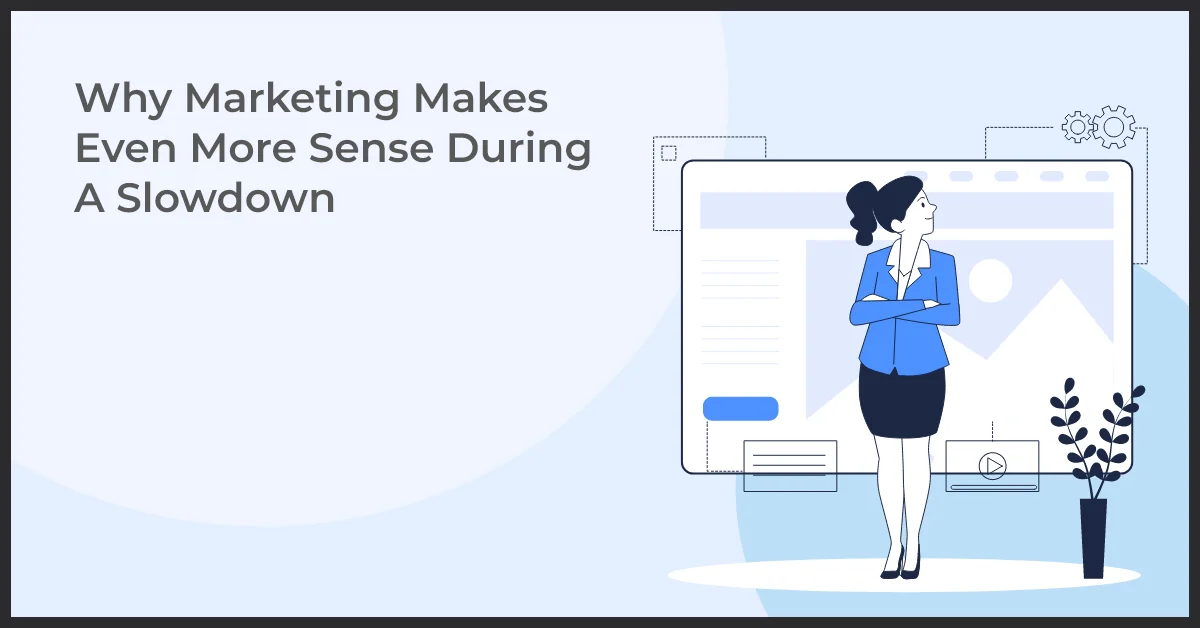Why Marketing Makes Even More Sense During A Slowdown

Published on: August 24, 2022
Updated on: October 23, 2024
2007 Views
- Digital Marketing
21 min read
Your first response to an economic downturn is to keep in step with the sluggish markets. Most of the time, it means cutting down on marketing budgets. For instance, during the Great Recession of 2008, ad spending decreased by 13%.
Nothing could be farther from the truth. Roland Vaile and Reavis Cox, who examined the 1920-21 recession, found that companies that invested in marketing continued to drive sales and growth. The 2007-2008 economic downturn also saw a similar pattern, with businesses that reduced marketing budgets performing better but only for a short period.
The long-term consequences of reduced marketing are the same as those initially caused by a recession. So what happens when you continue marketing during a slowdown?
Look no further to find out more.
The Downturn Impact
In times of economic slowdown, businesses and the economy as a whole experience significant challenges. The impact of a downturn can be far-reaching, affecting various aspects of a company's operations.
How a slowdown affects businesses and the economy
When the economy slows down, businesses face a decline in demand and reduced consumer spending. This decrease in demand can lead to decreased revenue and profitability for companies across different industries. Additionally, the overall economy may contract, leading to job losses and financial instability for individuals and households.
During a downturn, companies often struggle to maintain their current customer base and attract new customers. The reduced purchasing power of consumers can make it difficult for businesses to sell their products or services, further impacting their revenue streams.
Challenges faced by companies during a downturn
Companies face a range of challenges during a downturn. Some of the key challenges include:
- Decreased consumer confidence and spending
- Increased competition as businesses fight for a shrinking market
- Reduced access to credit and financing options
- Disrupted supply chains and increased costs
- Uncertain market conditions and economic volatility
These challenges can make it difficult for businesses to survive and thrive during a downturn. However, by implementing effective marketing strategies, companies can navigate through these challenges and position themselves for success.
Understanding Consumer Behavior During Recessions
Consumer behavior undergoes significant changes during recessions, as economic downturns bring about various impacts. To effectively navigate the recessionary market and tailor marketing strategies, it is crucial for marketers to comprehend these key characteristics and changes in consumer behavior. Furthermore, understanding the factors that influence consumer spending patterns and priorities can help identify opportunities and challenges for marketers in the recessionary market.
Key Characteristics and Changes in Consumer Behavior During Economic Downturns
During recessions, consumers tend to adopt cautious spending habits due to financial uncertainties. They become more price-sensitive and search for cost-effective alternatives. Brand loyalty may loosen as consumers seek better deals and value for their money. Additionally, there is often a shift from discretionary spending to essential purchases, such as basic necessities and essential services.
Factors Influencing Consumer Spending Patterns and Priorities
Several factors have a significant influence on consumer spending patterns and priorities during economic downturns. These include changes in income levels, employment stability, consumer confidence, and overall economic outlook. Additionally, government policies, inflation rates, and availability of credit impact consumer behavior. Understanding these factors enables marketers to align their strategies with consumer sentiments.
Identifying Opportunities and Challenges for Marketers in the Recessionary Market
While recessions bring challenges, they also open doors to new opportunities for marketers. Identifying these opportunities is crucial for effectively navigating the recessionary market. For instance, consumers may prioritize value for money and seek cheaper alternatives, creating opportunities for cost-effective products or services. Additionally, shifts in consumer behavior may create niches or unmet demand that marketers can tap into.
- Staying attuned to changing consumer preferences and adapting marketing strategies accordingly is essential during recessions.
- Marketers should evaluate and adjust their products or services to cater to the evolving needs and priorities of consumers.
- Creative and targeted messaging that emphasizes value, affordability, and quality can help marketers stand out in the recessionary market.
Despite the challenges posed by recessions, with a deep understanding of consumer behavior and adept marketing strategies, businesses can thrive even in turbulent economic times.
Marketing Strategies for Recessions
During a recession, businesses need to adapt their marketing strategies to navigate the challenging economic landscape. Here are some effective strategies that can help businesses thrive even in times of economic downturn:
Overview of effective marketing strategies during economic downturns
When faced with a recession, it's crucial for businesses to reassess their marketing strategies and focus on strategies that deliver the best return on investment (ROI). This may involve shifting marketing efforts towards targeting specific customer segments, exploring new markets, or revisiting pricing strategies.
Emphasizing the importance of value proposition and customer-centric approaches
In a recession, consumers become more price-sensitive and value-driven. Therefore, it's essential for businesses to clearly communicate their value proposition and differentiate themselves from competitors. By addressing consumers' needs and providing exceptional customer experiences, businesses can build loyalty and drive sales even during challenging economic times.
Leveraging data and analytics for targeted marketing campaigns
Data and analytics play a crucial role in guiding marketing decisions during recessions. By utilizing data-driven insights, businesses can identify high-value customer segments, personalize campaigns, and optimize marketing spend. This allows for more targeted and cost-effective marketing efforts, maximizing the return on investment.
By implementing these marketing strategies during a recession, businesses can not only survive but also thrive despite the economic challenges. It's important to adapt quickly and stay agile in order to remain competitive and sustain growth.
Economic Impact on Marketing
During a slowdown, marketing budgets and strategies are greatly affected. Companies tend to reduce their marketing spending in order to cut costs and survive the economic challenges. This can lead to a decrease in brand visibility and customer reach.
However, it is crucial for businesses to understand the importance of efficient utilization of marketing resources during such times. By strategically allocating limited resources, companies can still maintain brand awareness and garner customer attention.
Effects of a Slowdown on Marketing Budgets and Strategies
One of the immediate effects of a slowdown is a decrease in marketing budgets. Companies may have to make difficult decisions to trim their advertising expenses, resulting in reduced promotional activities and a decrease in brand exposure.
Additionally, marketing strategies may need to be adjusted to suit the changing market conditions. Companies may target niche markets or focus on cost-effective marketing channels to maximize the impact of their campaigns.
Importance of Efficient Utilization of Marketing Resources during Economic Challenges
During economic challenges, it becomes crucial for businesses to make the most of their limited marketing resources. Every dollar spent on marketing needs to be well-planned and optimized for maximum return on investment.
By conducting thorough market research and analyzing consumer behavior, companies can identify the most effective marketing channels and strategies to reach their target audience. Efficient utilization of marketing resources ensures that every effort counts and helps in maintaining the brand presence.
Marketing Is Essential in a Recession
There are numerous reasons for investing in marketing during a slowdown.
Retain Your Customers
A recession changes customers' spending power. So, their priorities change even if your customers wish to stay loyal. That does not mean businesses stop marketing to them completely. The right strategy requires a deep dive into the customers' needs and then tweaking and adjusting strategies, tactics, and products to their changing demands.
Gain More Attention
During a recession, most businesses cut their marketing budgets. As a result, they lose their voice and brand value. Continuing to invest in marketing will ensure that your brand is not just another footnote in economic history.
Project Trust and Stability
Businesses consistent with their volume and output enjoy four times the brand visibility over those who don't. This is especially pertinent during a recession as it signals trouble for your brand. Because of this, your consumers might lose confidence. By continuing with a strong marketing game, your customers would have no reason to worry about your business' health.
Target New Opportunities
A difficult time is good for testing your ability to innovate and find creative solutions. Instead of considering recession a period of stagnation, it could be just the opportunity to look for newer markets, alternative marketing techniques, and revenue streams.
For instance, the events industry quickly turned to a virtual mode when the global pandemic struck. They adapted and innovated to create products that allowed people to network and meet virtually at a time when social distancing was the new normal. And these trends are here to stay.
All of this is easier said than done as the question remains—how do you market during a recession?
Cost-Effective Marketing Methods
During a recession, it's essential for businesses to find budget-friendly marketing tactics that can still effectively deliver results. Here are some strategies that can help you continue promoting your brand without breaking the bank:
Exploring budget-friendly marketing tactics without compromising effectiveness
- Focusing on targeted email marketing campaigns to reach your audience directly.
- Optimizing your website for search engines to increase organic traffic.
- Creating valuable and informative blog content to establish your expertise and attract potential customers.
- Utilizing email newsletters to nurture leads and build strong customer relationships.
Utilizing social media platforms and content marketing for organic reach
- Regularly posting engaging content on platforms like Facebook, Twitter, and Instagram to connect with your audience.
- Using social media ads to target specific demographics and increase brand visibility.
- Implementing content marketing strategies, such as creating shareable infographics or informative videos, to engage your audience and drive traffic.
Creating partnerships and collaborations for shared marketing expenses
- Partnering with other complementary businesses to cross-promote each other's products or services.
- Collaborating with influencers in your industry to expand your reach and gain credibility.
- Joining industry alliances or associations to take advantage of collective marketing efforts.
By implementing these cost-effective marketing methods, businesses can navigate a recession period while still maintaining their brand visibility and attracting potential customers.
Budget Cuts and Resource Allocation in Marketing
During a recession, it becomes crucial for businesses to assess their marketing budgets and make necessary cost-saving measures. Here are some tips for effectively managing your marketing budget and reallocating resources:
Tips for assessing marketing budgets and determining areas for cost-saving
- Evaluate the performance and ROI of your current marketing campaigns
- Identify ineffective strategies that can be eliminated
- Consider reducing spending on traditional advertising channels
- Explore cost-effective alternatives like digital marketing
- Conduct market research to understand changing consumer preferences
Strategies for reallocating resources to prioritize essential marketing activities
- Focus on marketing activities that have a direct impact on sales
- Invest in targeted and personalized marketing campaigns
- Allocate resources to strengthen customer relationships and improve customer retention
- Create partnerships and collaborate with other businesses to share marketing costs
- Optimize your marketing efforts to reach your target audience more effectively
Evaluating the long-term impact of budget cuts on brand position and market share
While budget cuts may be necessary during a recession, it is important to carefully evaluate the potential long-term impact on your brand's position and market share. Consider the following factors:
- Ensure that budget cuts do not compromise the quality and consistency of your brand communication
- Monitor and analyze competitors' marketing activities to identify potential threats and opportunities
- Seek feedback from customers to understand their perception of your brand during challenging economic times
- Consider the potential consequences of reducing marketing efforts on brand loyalty and customer trust
By strategically managing your marketing budget and reallocating resources, your business can navigate through a recession and emerge stronger in the long run.
Brand Positioning in a Recession
The importance of aligning brand messaging with consumer sentiments during a downturn cannot be overlooked. In a recession, consumers are more cautious with their spending and are seeking value from the brands they choose to support. To maintain brand relevance and differentiation in a competitive market, it is crucial for businesses to focus on brand positioning strategies.
- Consistent brand messaging: During a recession, it is vital for brands to communicate their value proposition consistently. By understanding the concerns and needs of consumers, businesses can tailor their messaging to address those pain points and position their brand as a solution.
- Emphasize value and affordability: In a recession, consumers are more price-sensitive and are actively looking for deals and discounts. By highlighting the value and affordability of products or services, brands can attract customers who are seeking cost-effective options.
- Differentiate from competitors: During difficult economic times, competition becomes even fiercer. Brands need to find unique ways to stand out and differentiate themselves from their competitors. This can be achieved by focusing on unique selling propositions, innovative marketing campaigns, or exceptional customer service.
Case studies highlighting successful brand positioning during previous recessions serve as inspiration and provide valuable insights. By studying these examples, businesses can learn effective strategies and adapt them to their own brand's positioning in the current market.
Price Elasticity and Value-Based Marketing
During a recession, understanding price elasticity becomes crucial for businesses. Price elasticity refers to the responsiveness of demand for a product or service to changes in its price. In recessionary markets, consumers are more price-sensitive and are constantly seeking value for their money.
To effectively navigate through a recession, businesses must implement value-based marketing strategies. Value-based marketing focuses on emphasizing the unique benefits and value that a product or service offers to consumers. By highlighting the value proposition and delivering it effectively, businesses can attract price-sensitive consumers who are looking for the best bang for their buck.
One way to communicate brand value effectively is through pricing strategies and promotions. By strategically pricing products or services, businesses can create a perception of value and attract price-sensitive consumers. Promotions such as discounts, bundle offers, or limited-time offers can also drive immediate purchases and encourage consumers to try a product or service.
It is important for businesses to not only focus on offering competitive prices but also clearly communicate the value they provide. This can be done through effective messaging, highlighting the unique features, benefits, and advantages of the product or service. By creating a strong association between the brand and value, businesses can differentiate themselves from competitors and attract price-sensitive consumers.
5 Ways of Marketing During a Slowdown
Pivot Toward Psychological Segmentation
Traditional segmentation of your customers – one based on demographics or lifestyle – will not work during a recession. Instead of demographics, orient towards a psychological segmentation of your customers. Here is why:
Also known as psychographics, psychological segmentation focuses on unique personal factors driving consumers' choices and decisions, including personality, activities, opinions, interests, social class, and lifestyle. This type of segmentation:
- Allows for a better understanding of your consumers
- Reveals unseen attitudes
- Finetunes your targeted messaging
- Generates opportunity for product positioning
According to Harvard Business Review, your customers fall into four groups during a recession:
- Slam-on-the-brakes: These customers are the ones who are hardest hit financially and most vulnerable. They reduce spending by eliminating, postponing, decreasing, and substituting their purchases.
- Pained-but-patient: These consumers are less optimistic about their standard of living in the near future but resilient and confident about the long term. They also downsize like the slam-on-the-brakes segment but not as aggressively.
- Comfortably well-off: This segment comprises the top 5% income bracket, which is mostly unaffected by the recession.
- Live-for-today: They carry on as usual and remain, for the most part, unconcerned about savings. Their response to the recession is by postponing their major purchases.
By segmenting your users based on these four types, you can create the right message and tone for your product.
Invest More in Advertising
Historical data of past recessions and advertising during those periods clearly show the benefits of promoting your product during a downturn.
First, advertising space becomes less competitive because everyone is reeling from reduced budgets and cost-cutting. You can get more attention towards your products in a less noisy marketplace. In short, more recognition for your brand.
Second, investing in advertising reflects your corporate stability and that your buyers don't have to worry about your product/service going out of business.
Third, your Share of Voice – a brand's advertising share among the available portion in a marketplace – increases vis-à-vis your competitors.
Further, your ad investment should be a strategic one. Make sure your system is optimized to target potential customers and ads are customized to people depending on their place in the sales cycle. Investing in programmatic advertising also makes for a good advertising strategy.
Create Targeted Campaigns
Apart from advertising, streamline all aspects of your marketing campaign, especially during a recession. The pressure to generate more MQL leads to increases in a downturn. For that, you need to create optimized, targeted campaigns based on your customer's choices and preferences.
Ensure that your content and event marketing campaigns, content syndication, and digital lead generation ads are highly optimized and targeted.
Ensure Effective Marketing Approach
A recession allows you to overhaul your marketing department for maximum efficacy. Take steps like these to make your marketing run like a well-oiled machine:
- Integrate all your campaigns
- Develop a robust digital marketing strategy to support your event campaigns.
- It can start from a simple campaign harnessing the power of social media. If you already have a social media presence, you need to diversify, optimize and post interesting and relevant content for your audience.
- Mobilize your employees to extend your social media presence while leveraging ways to get your customers to generate content. It could be a review, an endorsement, a viral hashtag, etc.
- Online competitions are an excellent way to engage with your audience and generate new leads without giving too much away. It gets a lot of exposure and followers. For example, you can ask customers to share pictures along with your product. For every x number of likes or follows reached, you can then have a prize drawn amongst these contestants.
- Consider promoting and hosting virtual events. It helps reduce costs for your company.
- Develop email and other lead nurture streams to be highly optimized.
- Ensure your department works to maximize its effectiveness; create an atmosphere where your employees' skills are used properly and for growth and learning opportunities.
Focus on Value-Based Marketing
The most significant impact of a recession on marketing is a loss of consumer confidence. You can counter this by improving your value-based marketing strategy. This refers to placing your products based on the values it delivers to your audience. This particular strategy contrasts feature-based selling and marketing, often used by technology companies while marketing their products.
The value-based approach helps ease the spending mindset of your customers by focusing on the value your product will generate for them.
Customer Retention and Loyalty Programs
Building customer loyalty during economic downturns is crucial for the long-term sustainability and success of any business. When times are tough, customers may be more inclined to switch to cheaper alternatives or cut back on their purchases. Therefore, it is essential to design effective retention programs that safeguard customer relationships and keep them coming back.
Designing retention programs to safeguard customer relationships
During a recession, it becomes even more important to focus on retaining existing customers rather than acquiring new ones. This can be achieved by implementing loyalty programs that incentivize repeat purchases and encourage customer loyalty. By offering discounts, rewards, or exclusive benefits to loyal customers, businesses can strengthen their relationship with them and increase the likelihood of repeat business.
Furthermore, it is crucial to actively communicate with customers and listen to their needs and concerns. By addressing any issues promptly and providing exceptional customer service, businesses can enhance customer satisfaction and build trust, ultimately fostering long-term loyalty.
Leveraging digital platforms and personalized experiences for customer retention
In today's digital age, businesses have a plethora of tools and platforms at their disposal to connect with customers on a more personalized level. By leveraging social media, email marketing, and other digital channels, businesses can stay engaged with customers and nurture relationships even during a recession.
Personalization is key when it comes to customer retention. By tailoring marketing efforts to individual preferences and interests, businesses can create a more meaningful and relevant experience for their customers. This can be achieved through personalized email campaigns, targeted advertisements, and customized product recommendations.
Additionally, businesses can use data analytics to gain insights into customer behavior and preferences. By analyzing this data, businesses can identify opportunities to further personalize their offerings and tailor their marketing strategies to meet individual customer needs.
In conclusion, customer retention and loyalty programs play a vital role in marketing during a recession. By designing effective retention programs and leveraging digital platforms for personalized experiences, businesses can ensure the loyalty of their existing customers and increase their chances of thriving even in challenging economic times.
Competitor Analysis During Economic Downturns
In times of economic recession, it becomes even more crucial for businesses to stay ahead of their competitors. This is where competitor analysis comes into play. By closely monitoring and understanding your competitors' strategies, strengths, and weaknesses, you can identify opportunities for differentiation and gain a larger share of the market.
Importance of Competitor Analysis in Recessionary Markets
During economic downturns, consumer behavior and market dynamics change significantly. Competitor analysis allows you to stay updated with the latest industry trends and developments. It helps you assess how your competitors are adapting to the challenging market conditions and enables you to make informed decisions about your own marketing strategies.
By keeping a close eye on your competitors, you can proactively respond to shifts in consumer preferences and market demands. This not only helps you stay relevant but also positions your brand as a leader in the industry.
Assessing Competitor Strategies, Strengths, and Weaknesses
Competitor analysis involves evaluating your competitors' overall strategies and understanding their strengths and weaknesses. This assessment can provide valuable insights into the factors that contribute to their success or limitations during a recession.
By examining the marketing tactics of your competitors, you can identify areas where they excel and find ways to match or surpass their efforts. Additionally, studying their weaknesses can help you identify gaps in the market that you can efficiently target and capitalize on.
Identifying Opportunities for Differentiation and Gaining Market Share
During a recession, customers become more value-conscious and are constantly on the lookout for the best deals. Competitor analysis allows you to identify opportunities for differentiation and develop strategies that set your brand apart.
By identifying gaps in the market or weaknesses in your competitors' offerings, you can position your products or services as the better alternative. This can be achieved by emphasizing unique selling points or offering additional value to customers.
Furthermore, competitor analysis enables you to gain insights into untapped market segments that your competitors may have overlooked. By identifying these opportunities, you can tailor your marketing efforts to attract and retain customers in these specific niches.
Competitor analysis is a vital component of effective marketing during a recession. By staying updated on your competitors' strategies, strengths, and weaknesses, you can position your brand strategically, adapt to changing consumer behavior, and maximize your market share.
Conclusion
It is crucial to emphasize the importance of adaptability, customer-centricity, and data-driven decision making during a recession. By staying agile and responsive to changing consumer needs, businesses can position themselves for success.
Instead of viewing recessions as setbacks, marketers should see them as opportunities for innovation and growth. By thinking creatively and finding new ways to connect with customers, businesses can thrive even in challenging economic environments.
A recession tests your resilience. Your loyal customers are only biding their time when things take a turn for the better to continue with their brand loyalty and consumption. Instead of an instinctive-driven response to the reduced income or market share, you should develop a creative marketing plan that works with your strengths for a longer period.
You will ensure that you will capture maximum market share by continuously investing in marketing even during a slowdown.
At Growth Natives, we understand what goes through your mind during a period of downturn. Our help is at hand to help you navigate through. Contact us or write to us at info@growthnatives.com to find out more.



